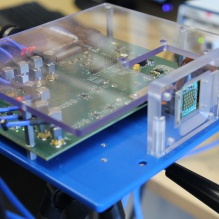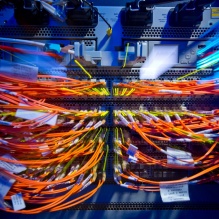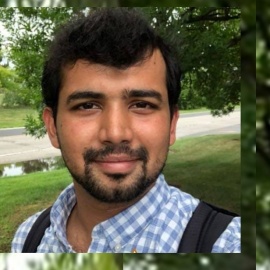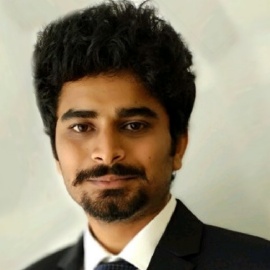Engineering Sciences (Internet of Things) MS



The Internet of Things (IoT) refers to a network of physical objects, including devices, vehicles, buildings, and various items, that are equipped with electronics, software, sensors, and network connectivity. This enables these objects to gather and exchange data.
The Engineering Science MS program with a focus on IoT, is tailored to address the growing demand from employers seeking experts who can engineer innovative interactive services, handle data acquisition, fusion, and processing from sensors, actuators, controllers, and other devices, and design architectures to connect these components as part of more extensive and diverse systems.
In this rapidly evolving field, potential career opportunities span industry sectors such as energy, healthcare, transportation, infrastructure, and manufacturing. Students in this program will receive comprehensive training in various IoT technologies and develop skills and advanced knowledge in areas like data analytics, IoT architecture, and distributed application development.
Our flexible program allows students to further focus their academic interests through various elective courses, and culminates in a portfolio of work that showcases the skills acquired throughout the program. Classes are modestly sized and emphasize best classroom practices while employing online resources to reinforce the classroom experience.
Each year, Buffalo hosts a Day for 5G and Wireless Internet of Things and the University at Buffalo is a proud sponsor.
The event provides a unique forum for sharing innovative research ideas, recent results and experiences for researchers and practitioners in 5G (and beyond), IoT, and AI/ML for wirelessly networked systems.
Applicants must hold a bachelor's degree or qualified equivalent in Electrical Engineering, Computer Engineering, Computer Science or a closely related field and have an average undergraduate GPA of at least a B or 3.0 (on a 4.0 scale) from a regionally accredited institution. The GRE is not required.
Application Materials:
Students can apply online. New applicants must create an account. If you have applied in the past, you will be asked to log in to your existing account to start a new application.
The application includes sections that will ask you to provide us with personal/biographical information, contact information, citizenship details, your past or current college/university, and degree details. You will be able to enter the names and contact information of your recommenders and upload supporting materials to your application. You may upload supporting documents while completing the application form or after you have submitted your application in your Application Status Portal.
You do not need official transcripts or test scores to apply. Unofficial copies are sufficient for application review, but students are encouraged to provide official copies if they have them.
A non-refundable fee of $100 is required to apply for Spring 2025 or later terms. The application fee for Fall 2024 is $85. After you submit your application form, you can pay the application fee online in your Application Status Portal with a credit card or e-check.
Please upload a brief personal statement describing your educational objectives, your academic experience, and why you're interested in the program. There is no required length or word limit for the statement.
Upload a resume or curriculum vitae (CV) to your application. Your resume or CV should include details about your education, employment, and internship history. Pertinent research experience should be included as well.
Copies of transcript(s) for all post-secondary schoolwork must be uploaded with your application for initial review. Upon an offer of admission, accepted applicants will be required to submit official transcripts and proof of degree(s).
GRE scores are optional for this program. If you would like to take the GRE, you can arrange to take it through the Educational Testing Service (ETS). Official scores should come directly from ETS.
Note: the University at Buffalo Institutional Code is 2925.
International applicants are required to provide proof of English proficiency. The chart below outlines acceptable test types and the university's minimum score required for admission. All applicants whose native language is not English will be required to provide proof of English proficiency.
Copies may be submitted for initial review. Official scores must be sent directly to UB from the testing agency.
| Test Type | University Minimum Score | To Order... |
|---|---|---|
| TOEFL (IBT) (including MyBest scores) TOEFL Home Edition | 79 | Use Institution Code 2925 |
| TOEFL Essentials | 8.5 | Use Institution Code 2925 |
| TOEFL ITP Plus | 550 | Use Institution Code 2925 |
| IELTS and IELTS Indicator | 6.5 | Select "University at Buffalo, State University of New York (SUNY)" |
| 55 | Select "University at Buffalo, State University of New York (SUNY)" | |
| Cambridge English Proficiency (CPE) | 185 | Select "University at Buffalo, State University of New York (SUNY)" |
| Cambridge English Advanced (CAE) | 185 | Select "University at Buffalo, State University of New York (SUNY)" |
| Duolingo English Test (DET) | 120 | ADA Department of Testing will report your official scores to central application services |
Exam results must be dated within two years from your proposed date of admission and remain valid upon entering the term for which you applied.
It is strongly recommended to make test arrangements early in the year so sufficient time can be allowed for the results to be reported before application deadlines.
Exemptions to English Language Proficiency requirements can be found on The Graduate School website.
Students will take 10 courses for a total of 30 credits. Most students complete the program in three semesters. Courses fall into two main categories: the Internet and the Things:
- For the Internet, students focus on courses in communications and networking.
- For the Things, students become familiar with hardware (courses in sensors, embedded systems, antennas/RF, power systems).
Core Courses
- EE 526 Wearable and Implantable Sensors
- EE 534 Principles of Networking
- EE 538 Principles of Modern Digital Communications
- EE 541 Energy Storage
- EE 701: Special Topics: Internet of Things
Elective Courses
- EE 516 Introduction to Digital Signal Processing
- EE 530 Fundamentals of Solid State Devices
- EE 531 Probability and Stochastic Processes for Engineering
- EE539 Principles of Information Theory and Coding
- EE 549 Analog Integrated Circuits Layout
- EE 569 RF & Microwave Circuits
- EE 574 RF & Microwave Circuits 2
- EE 553 Microelectronic Fabrication Laboratory
- EE 559 Big Data Analytics
- EE 567 Power Electronics
- EE 620 MIMO Wireless Communications
- CSE 508 Programming with Python
- CSE 516 Commerce Technology
- CSE 524 Realtime & Embedded Systems
- CSE 555 Introduction to Pattern Recognition
- CSE 565 Computer Security
- CSE 566 Wireless Networks Security
- CSE 570 Introduction to Parallel and Distributed Processing
- CSE 574 Introduction to Machine Learning
- CSE 603 Parallel & Distributed Processing
- CSE 626 Data Mining
- CSE 642 Techniques of Artificial Intelligence
- CSE 676 Deep Learning
For questions about the Engineering Science (Internet of Things) MS program, contact us at eegradapply@buffalo.edu. For questions about admission or your application, contact easgrad-enroll@buffalo.edu.








